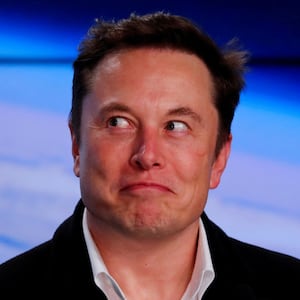As a public company, Twitter, like Tesla, has shareholders whose interests are under the protection of the Securities and Exchange Commission—the same agency that has taken Elon Musk to the woodshed many times over the last several years for potential harms caused to Tesla shareholders.
But private companies—like the one Musk is about to make of Twitter—don’t have that kind of protection. They’re run at the pleasure of their owners.
And few owners take as much pleasure in stirring up trouble as Musk, whose clashes with the SEC began in earnest in 2018, when the feds fined Musk and Tesla $20 million each to settle fraud charges after he infamously tweeted “Am considering taking Tesla private at $420. Funding secured.” It apparently wasn’t, and Musk was required to resign as chairman of Tesla’s board, as well as submit to having his tweets reviewed by lawyers to ensure he wasn’t misleading or otherwise harming shareholders.
ADVERTISEMENT
He was back in hot water with the SEC within months, after tweeting that Tesla would produce half a million cars in 2019. In 2020 Tesla’s shares plummeted after he tweeted, “Tesla’s stock price is too high imo,” and the SEC yelled at him some more, joining the National Labor Relations Board, which made him take down a tweet advising Tesla employees against forming a union.
A man like Musk might well have chafed at having to obey “mother may I” restrictions aimed at correcting his legendarily poor impulse control on Twitter. But now that he has agreed to buy Twitter for about $44 billion and take the company private, Musk will never again need to worry about the SEC interfering with his freedom to tweet whatever he wishes, true or false.
However, the purchase deal is an LBO, or leveraged buyout, one of the largest in history. Musk has pledged $21 billion in cash, the source of which has not been disclosed at the time of writing; the rest is debt, financed by a group of banks including Morgan Stanley, Bank of America, and BNP Paribas, which debt evidently accounts for more than half the deal—$13 billion in bank loans, plus $12.5 billion in loans against Musk’s Tesla stock, according to a Times report. Rich as Musk is, that is a lot of sugar.
Like Bob Dylan sang, everybody’s gotta serve somebody, and to some degree Musk, and Twitter, will presumably now be serving the banks, instead of the SEC. In other words, in order to service the immense debt the company and its new owner are taking on, Twitter will need to produce a lot more revenue—and that means big changes for the platform.
Since Twitter shareholders will be making a lot of money on their shares, the SEC won’t be complaining about the sale, and antitrust regulators probably won’t either, since Musk isn’t buying a competitor. The White House bleated, just a little bit, with Press Secretary Jen Psaki saying, “The president… has long argued that tech platforms must be held accountable for the harms they cause.” In short, the sale, improbable as it seemed just days ago, appears likely to go through.
After the announcement, Musk was quick to stress his vaunted goal of making Twitter a haven for “free speech.”
This high-minded, egalitarian sentiment is at odds with Musk’s long, erratic and troubled history on Twitter, which continues to this day. He tweeted a series of wildly incorrect COVID-19 predictions in 2020 (“Based on current trends, probably close to zero new cases in US too by end of April”), offered his support to Kanye West’s presidential bid, and accused the 2018 rescuer of Thai kids from a cave of being a “pedo guy.” Just days ago, angered by reports that Bill Gates is shorting Tesla’s stock to the tune of $500 million, Musk tweeted a pregnant man emoji alongside a photo of Gates and the caption, “in case u need to lose a boner fast.”
The Twitter sale will reportedly take about six months to conclude, and for a lot of journalists, including myself, the biggest concern is the fate of the platform’s openness as a key hub where the world’s journalists communicate unhindered. Huge corporations now control most of the communications between journalists on the internet, and authoritarian governments have either tightened their grip on permitted sites or eliminated the open internet entirely. For all its faults, Twitter is one of the few places left where individuals in democratic countries can contact one another, freely and in public, outside the immediate control of a platform. It’s very dangerous for one mercurial, imperially self-involved man, the richest in the world, to have absolute control over it.
And this isn’t a random whim. Musk’s purchase of Twitter is of a piece with oligarchical moves like Peter Thiel’s attack on Gawker in 2016 and Joe Ricketts’ closure of DNAinfo in 2017. Money itself having long since ceased to have any real meaning to them, hyper-rich men are quite willing to squander enormous amounts of it in order to control and silence their critics, and remove all impediments to their own ambitions.
We may not see Elon Musk’s new Twitter banning users for denouncing his taste in hats or his puerile attempts at wit, but it will be interesting to see, after he takes control, how long talk of Tesla shorts continues to be freely permitted on the platform.






